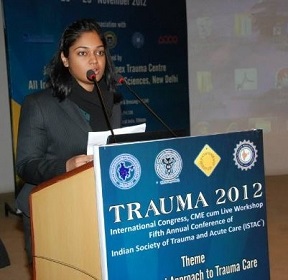
Aparajita Kumar
IndiaTitle: SUCCESSFUL THROMBOLYSIS BY LOW DOSE SLOW INTRAVENOUS ALTEPLASE INFUSION IN CRITICALLY ILL PATIENTS WITH STUCK PROSTHETIC MITRAL VALVE:A CASE STUDY
Abstract:
Prosthetic valve thrombosis(PVT) contributes to significant post valve replacement mortality and morbidity.Treatment guidelines are controversial,ranging from surgical intervention to thrombolysis.We report a case study of two challenging patients who presented in our hospital,known Rheumatic Heart Disease,Post Mitral Valve Replacement,with Acute Left ventricular failure in NYHA class IV and PVT,of which one had coagulopathy with grossly deranged INR.Both patients were put on intermittent non invasive ventilator and inotropic supports,and successfully thrombolysed with low dose slow intravenous Alteplase infusion given every 6 hours in discrete doses with monitoring of PT/INR and mitral valve gradients,resulting in remarkable clinical improvement .Their successful treatment shows that thrombolysis can be considered as an effective treatment modality in high risk surgery patients with stuck prosthetic mitral valve.
INTRODUCTION
Rheumatic heart disease is a commonly encountered cause of valvular heart disease in developing countries like India.PVT is rare,but one of most dreaded complications of prosthetic heart valves,and may have disastrous clinical implications,sometimes life threatening.The incidence of PVT is 0.1- 6 % per patient year in left sided valves,and upto 20% of tricuspid valves.Mitral valve thrombosis is,on an average,5 times more common than that of prosthetic aortic valves.PVT has been classified into two subtypes,obstructive PVT(OPVT),and non obstructive PVT(NOPVT).There have been conflicting treatment modalities despite significant research, with thrombolysis,thrombectomy and prosthetic valve replacement being the available treatment options.There has been no uniform consensus for management of prosthetic valve thrombosis due to lack of randomised controlled trials comparing fibrinolytic and surgical therapy in PVT.The European Society of Cardiology recommends surgery for all,irrespective of clinical condition,whereas the Society of Heart Valve Diseases recommend thrombolytic therapy in all patients without contraindications.None of the guidelines mention a class I recommendation for the management of PVT. The traditional approach to PVT is surgical prosthetic replacement,but it is associated with high mortality,upto 60% during emergency condition in NYHA class IV patients.In contrast,thrombolysis is an attractive alternative,associated with lower mortality
risk,high success rate,and is much more cost effective.
CASE PRESENTATION
A 52 year old male,known rheumatic Heart Disease,Post BMV(2002),Post Aortic valve and mitral valve replacement in 2019-St Jude Mechanical valve,paroxysmal atrial fibrillation, presented in our centre with progressive worsening breathlessness alongwith history of fever.On arrival in ER,he was sick,found to be in cardiogenic shock and acute congestive cardiac failure.BP was 80/50 mm systolic,with HR:111/min.He was in obvious respiratory distress and unable to lie flat on the bed.He was afebrile,temperature 98 degrees , with respiratory rate 25/minute, elevated jugular venous pulse,and significant bilateral lower limb swelling.Chest auscultation revealed bilateral basal crepitations.Cardiac examination revealed surgical sternotomy scar,variable S1 and S2,audible prosthetic valve click in aortic area,which was not appreciated in mitral area.Routine clinical investigations revealed elevated leucocyte counts, Hb-9.0,TLC-20000 with deranged hepatic and renal parameters,SGOT-3410,SGPT-4170,Urea:141,Creatine-2.0.The coagulation profile was deranged,International Normalised Ratio being 14.4. Chest X Ray revealed bilateral non homogenous opacities ,with bilateral pleural effusion.Ultrasound abdomen revealed hepatomegaly ,grade I fatty liver with diffuse gall bladder wall thickening.In view of ongoing pandemic,throat/nasal swab for Covid 19 RT PCR, Respiratory panel and H1N1 sent were negative.He received FFP transfusion in view of deranged INR. Post transfusion INR was 3.6 2D Echo done revealed Dilated RA/RV with severe LV systolic dysfunction,EF 25% with stuck mitral valve,mean gradient 17 mm Hg,with normally functioning aortic valve.The patient’s relatives were explained in detail about the clinical condition,plan of thrombolysis,alongwith risks of bleeding ,systemic embolization and stroke.
Biography:
Dr Aparajita Kumar has completed Diploma Cardiology in 2015 from MS Ramaiah Narayana Hrudalaya, Bangalore,,and is an International Associate, American College of Cardiology.She has over 7 years experience in Cardiology having previouly worked in leading corporate hospitals,,and is presently working as Consultant Cardiology-Non interventional in Max Hospital Dehradun, India.She has attended several national and international conferences,and has been a presenter in International Trauma Conference.She had been awarded Second prize in National Young Genie Champion in Cardiology in 2016.She has a keen interest in research,and completed Research to Publication course by UCMS California and BMJ for designing clinical trials and scientific writing,and was awarded 200 CPD credits for the same.Her key interests are Preventive cardiology, echocardiography and hypertension.
